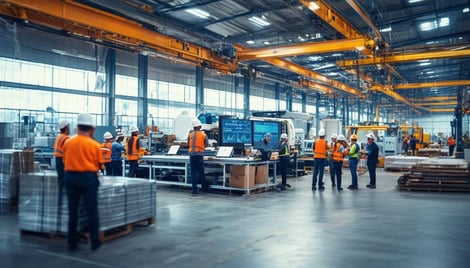The Impact of Global Supply Chain Trends on Scheduling
Industrial manufacturing is navigating an era of rapid transformation, driven by global supply chain trends reshaping how organizations manage scheduling and operations. As a Supply Chain Manager, understanding these trends and leveraging advanced tools like PlanetTogether APS integrated with SAP, Oracle, Microsoft, Kinaxis, or Aveva can help you optimize scheduling, improve agility, and maintain competitiveness in this evolving landscape.
This blog explores key global supply chain trends affecting scheduling and how the integration of PlanetTogether (APS) can mitigate challenges and unlock opportunities for industrial manufacturers.

Global Supply Chain Trends Impacting Scheduling
Supply Chain Disruptions and Resilience
The past few years have seen unprecedented disruptions—from pandemics to geopolitical conflicts and natural disasters. These events have underscored the importance of building resilient supply chains. For scheduling, this means adopting strategies to minimize disruptions and manage uncertainties.
Impact on Scheduling: Unpredictable supply disruptions create a ripple effect, causing delayed raw material deliveries and impacting production timelines.
Solution: PlanetTogether APS, integrated with systems like SAP or Kinaxis, can dynamically adjust production schedules based on real-time supply chain data, ensuring minimal downtime and maximum throughput.
Demand Volatility and Customization
Consumer expectations are shifting toward personalized products, which demand flexibility in production processes. The rise of demand volatility adds complexity, requiring agile scheduling to meet changing customer needs without compromising efficiency.
Impact on Scheduling: Fluctuating demand makes static production schedules obsolete, necessitating real-time adaptability.
Solution: With PlanetTogether and Oracle integration, you can leverage predictive analytics to anticipate demand changes and automatically adjust schedules, ensuring efficient resource allocation.
Sustainability Initiatives
Sustainability is no longer optional; it’s a business imperative. Governments and customers alike are pressuring manufacturers to reduce waste, lower carbon footprints, and adopt circular supply chain practices.
Impact on Scheduling: Aligning production with sustainability goals can introduce complexities, such as optimizing for energy-efficient operations or minimizing waste.
Solution: PlanetTogether APS, when integrated with Aveva, allows you to prioritize energy-efficient scheduling, track sustainability metrics, and align operations with eco-friendly objectives.
Digital Transformation and Industry 4.0
The industrial manufacturing sector is embracing Industry 4.0 technologies, such as IoT, AI, and advanced analytics, to enhance efficiency and decision-making. These innovations are revolutionizing supply chain management and scheduling.
Impact on Scheduling: With data flowing from IoT devices and sensors, scheduling systems must process vast amounts of information in real-time.
Solution: Integrating PlanetTogether with Microsoft Dynamics enables real-time data synchronization, allowing schedules to adapt to machine performance and material availability instantaneously.
Labor Shortages and Workforce Dynamics
Labor shortages remain a persistent challenge across industries. Coupled with changing workforce expectations, this trend necessitates smarter scheduling to balance workloads and improve employee satisfaction.
Impact on Scheduling: Limited labor availability can disrupt production schedules, while erratic shift patterns may affect employee morale.
Solution: PlanetTogether APS, integrated with Kinaxis, provides advanced workforce scheduling capabilities, balancing workloads while accommodating labor constraints.
![]()

The Role of Integration in Transforming Scheduling
The integration of PlanetTogether APS with ERP and supply chain management systems (SAP, Oracle, Microsoft, Kinaxis, or Aveva) enables industrial manufacturers to address these global trends effectively. Here’s how:
Enhanced Visibility Across Supply Chains
Integration ensures a unified view of supply chain operations, breaking down silos and providing real-time data insights.
Example: SAP integration with PlanetTogether enables synchronized production and inventory data, improving accuracy in scheduling and inventory planning.
Real-Time Decision-Making
The ability to make real-time adjustments is critical in today’s dynamic environment. Integrated systems provide the agility needed to respond to disruptions.
Example: A Kinaxis-PlanetTogether setup allows for scenario planning and real-time rescheduling when supply chain bottlenecks occur.
Improved Collaboration
Collaboration among teams and stakeholders is vital for smooth operations. Integration facilitates seamless communication across departments.
Example: Oracle integration with PlanetTogether bridges the gap between procurement, production, and logistics, ensuring everyone is aligned with updated schedules.
Optimization of Resources
Integrated systems leverage advanced algorithms to optimize the use of resources—materials, labor, and machinery—based on real-time constraints.
Example: With Microsoft Dynamics and PlanetTogether, manufacturers can automate job sequencing, reduce machine idle times, and increase overall efficiency.
Sustainability and Compliance
Integration helps track and optimize for sustainability goals, ensuring compliance with regulations and customer expectations.
Example: Aveva integration with PlanetTogether allows for energy consumption tracking and sustainable resource planning.

Key Takeaways for Supply Chain Managers
Adopt Agile Scheduling Solutions: Flexibility is the key to navigating supply chain uncertainties. Tools like PlanetTogether, integrated with leading ERP systems, provide the adaptability needed to stay ahead.
Leverage Data-Driven Insights: Integration allows access to real-time data, enabling predictive analytics and better decision-making.
Focus on Sustainability: Align scheduling practices with sustainability goals to meet regulatory requirements and customer expectations.
Prioritize Collaboration: Break down silos within your organization by integrating scheduling tools with ERP and supply chain management systems.
As global supply chain trends continue to evolve, the ability to adapt scheduling practices will define success in industrial manufacturing. Integration between advanced planning tools like PlanetTogether and systems like SAP, Oracle, Microsoft, Kinaxis, or Aveva will be a cornerstone of this evolution.
Investing in such integrations not only enhances scheduling capabilities but also drives efficiency, resilience, and sustainability—key attributes for thriving in a dynamic market.
Are you ready to take your manufacturing operations to the next level? Contact us today to learn more about how PlanetTogether can help you achieve your goals and drive success in your industry.
Topics: Industrial Manufacturing, PlanetTogether Software, Integrating PlanetTogether, Sustainability Initiatives, Supply Chain Disruptions and Resilience, Demand Volatility and Customization, Labor Shortages and Workforce Dynamics, Digital Transformation and Industry 4.0





















LEAVE A COMMENT